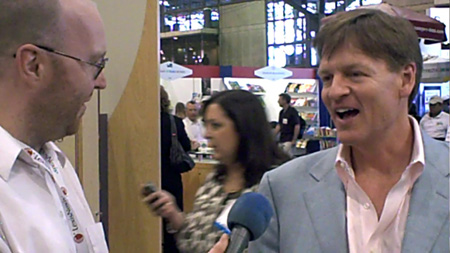Panel: Book Reviews 2010: What Will They Look Like?
Participants: John Reed, The Brooklyn Rail (Moderator); Ben Greenman, The New Yorker; Otis Chandler, Goodreads; Bethanne Patrick, The Book Studio; David Nudo, Shelfari; Peter Krause, Tactic Co.
I certainly went to this morning’s NBCC-sponsored panel with an open mind. Alas, with stiff moderator John Reed reading word-for-word off of his list of questions and the question of whether book reviews were even worth saving largely ignored, this was, as you might expect, business as usual, with Ben Greenman and Otis Chandler offering the only real substantive commentary. The rest was buzz words and bullshit dichotomies. Expert content vs. user-generated content, book reviews versus book recommendations, Coke vs. Pepsi. While Bethanne Patrick was very careful to ask everyone not to contain their silent fury, I kept my hand raised during the Q&A and was not called upon. I presume that they found out about the cherry bomb I planted in the boys room toilet.
You knew that something was off with this panel pretty early. But the question percolating in my mind had more to do with whether these people even loved books anymore, or even cared about lively writing. And I suppose it was answered when Reed asked the question, “Is there anything that you’re looking forward to leaving behind?” There was uncomfortable silence from the quintet, before Bethanne Patrick replied that she was very interested in leaving behind the idea that there were plenty of places for authority.
(It is worth noting that as I type these words in the BEA Press Room, I am listening to a robotic-sounding author talking in a very stilted tone about the “emotional charge” in his book. I have no idea who he is, but that’s part of the problem. Yes, this is the mechanical level of excitement here. Dare to express even the slightest feeling and you will be dragged away by Jacob Javits security.)
I think the fact that these five people don’t have any value or excitement for what they are offering — or are diffident about expressing such value or excitement — should say it all. Don’t sit there in silent fury or anything. Except that there’s really no place for you here.
“What is authority?” asked Peter Krause, who offered several dollops of generalized Gladwell/Anderson-style terminology for the crowd, including some of the silly dichotomies I have described above. How does Twitter give you authority? Does it come when somebody follows you? Or is it the way in which you link?
I wanted to get the panel discussing the all-important question of whether one should tweet in one’s underwear or not. Or perhaps they might consider the side effects of drunk tweeting. Or how you might lose a few followers if you tell an off-color joke that offends a few people. That seemed a far more intellectual discussion pertaining to “Book Reviews 2010” than anything presented at this joke of a discussion.
At least Ben Greenman was wise enough to suggest to the crowd, “You should probably listen to yourself.” He cited John Leonard as a critic whom he disagreed with 70% of the time, but who wryly pointed out the benefits of adversarial writing. Yes, I thought to myself, if only we could have some of that right now to counter all this groupthink bullshit.
“We do need a guide to navigate through the wilderness,” said Otis Chandler. “Who are the experts?” All well and good, but it all seemed comparable to some rich guy hiring a guide to hack his way through a jungle. It also seemed to me that Chandler’s position — despite the apparent egalitarian nature of Goodreads — was very much rooted in discounting the audience’s intelligence. Part of the success of Goodreads, as I ranted and raved to a few gracious listeners after the panel, is because there is no longer a place for enthusiasm or excitement in the newspapers. While I did agree with Chandler that people are more inclined to listen to their friends, what Chandler (and the other panelists with the possible exception of Greenman) missed was the possibility that critics never present themselves as trusted friends to the readers. They dictate rather than get people excited. And the hoary heads stuck up the sad ass of this industry seem to misunderstand and underestimate the ability for people to find an alternative when they’re talked down to as if they’re wearing dunce caps.
Forget about Book Reviews 2010. What about Book Reviews 2009? Or Book Reviews 2004? These are the real questions these people should be asking. But they won’t. Because I don’t think they really have any answers.
